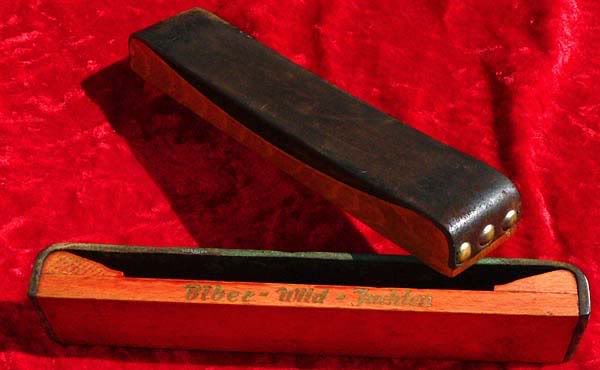Results 11 to 18 of 18
Thread: My Bridge Strop
-
01-18-2012, 06:24 PM #11Senior Member



- Join Date
- Apr 2008
- Location
- Essex, UK
- Posts
- 3,816
Thanked: 3164
They have been around for quite a while - most that I have seen came from europe, and a lot of those were German. Heres a pic of one:

The old ones seem to be on the small side - 6" - 8" and from the hardness of the leather I have an idea that they wetted it before attaching it to give it some stretch that would tighten up as it dried - wetted leather gets a bit harder, especially if hot water has been used.
Nothing like xMackx's one though - that has some really useful stropping length on it. Sharptonn has got something similar - an enormous beast with variable tension, made by a US maker called Lipshaw, I think.
In the UK you used to find them for sharpening microtome razors. One scientific supplies company in the UK - Brunel Microscopes, I think - still have one in their current catalogue which is the same as the small european ones.
Regards,
Neil
-
The Following User Says Thank You to Neil Miller For This Useful Post:
AlanII (01-18-2012)
-
01-18-2012, 09:22 PM #12


xMackx
Nice job, I wasn't comfortable holding mine and don't have a bench so I made a mount from bits of scrap wood (handle is from a curtain rail!). Ugly but works!
-
01-18-2012, 09:31 PM #13

This is a pretty cool idea! What are the pros/cons over a regular hanging strop? I saw you mention better feedback, but anything else? I guess the same amount of tension on the strop every time.
Why the raised center of the bridge? Aesthetics, or does it serve a purpose? And what is the material (red and white) under the leather?
-
01-18-2012, 11:10 PM #14Senior Member

- Join Date
- Sep 2011
- Location
- Northern Kentucky
- Posts
- 124
Thanked: 15
One way of making it adjustible would be to keep one end free with a handle so you could manually adjust the tension while you use it.
-
01-19-2012, 05:09 AM #15

Truckman, these are used in Germany quite a bit, more tradition than pros/cons I think. No purpose I can see for the raised center, apart from aesthetics and possibly it provides more wood for a bench screw from underneath...
The 'bridge' supporting the leather is actually balsa wood, covered in thick red felt. The balsa provides stiff support to avoid leather sag but with a regular amount of flex and the felt acts as a cushion. The strop works great but I haven't had it long enough to see how it holds out in the long-term....(cheap eBay find but I've seen they sell for about the same price as a hanging strop).
-
The Following User Says Thank You to MichaelS For This Useful Post:
Truckman (01-19-2012)
-
01-19-2012, 08:44 AM #16

I think the pros of using one is that you're not focused on keeping the right tension. Gives me a lot more feedback than a paddle or a hanging, and it has a slight flex to it which is important. If you try one you'll see what I mean, I'm planning on making more.
-
The Following User Says Thank You to xMackx For This Useful Post:
Truckman (01-19-2012)
-
01-19-2012, 10:12 AM #17

Thanks for the info guys. One last question, what type of leather can you use for a strop? Is it just any old leather you can pick up from a leather store, like a Tandy Leather?
-
01-19-2012, 10:50 AM #18Senior Member



- Join Date
- Apr 2008
- Location
- Essex, UK
- Posts
- 3,816
Thanked: 3164
Apart from the minor considerations of making it a bit lighter and saving wood for other purposes (you could conceivably machine two out of a board that is 3x as thick as one strop bed rather than 4x as thick), if the leather is under tension then the wood would tend to distort and bow in the middle - making it thicker at that point would add strength and resist bowing.
I can appreciate that the balsa/felt board under the leather adds a bit of cushioning, but I don't think that is its primary funtion. If the leather was at the correct tautness it wouldn have inherent 'give' and the board under it would not be necessary. If you wanted to avoid wetting the leather (and the attendant darkening and hardening that this entails) then it would be a bit looser - one way of tightening it is to slip something under it. Another reason is that the edges on this type of strop often curve downwards towards the base - the board helps to keep them flat.
Regards,
NeilLast edited by Neil Miller; 01-19-2012 at 10:54 AM.
-
The Following User Says Thank You to Neil Miller For This Useful Post:
BanjoTom (01-19-2012)


 10Likes
10Likes LinkBack URL
LinkBack URL About LinkBacks
About LinkBacks







 Reply With Quote
Reply With Quote